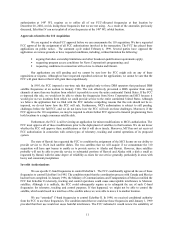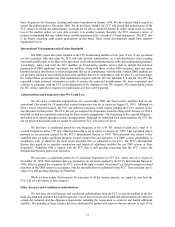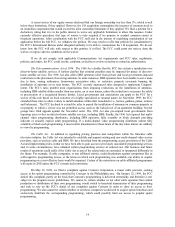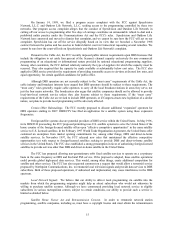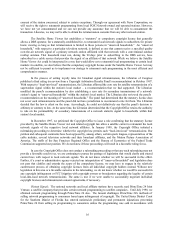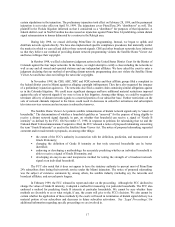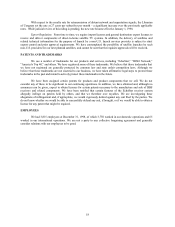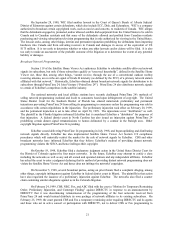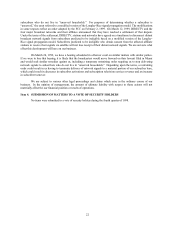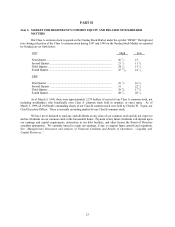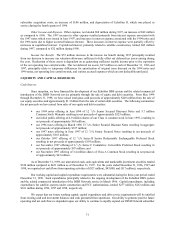Dish Network 1998 Annual Report Download - page 23
Download and view the complete annual report
Please find page 23 of the 1998 Dish Network annual report below. You can navigate through the pages in the report by either clicking on the pages listed below, or by using the keyword search tool below to find specific information within the annual report.21
On September 28, 1998, WIC filed another lawsuit in the Court of Queen’s Bench of Alberta Judicial
District of Edmonton against certain defendants, which also include ECC, Dish, and Echosphere. WIC is a company
authorized to broadcast certain copyrighted work, such as movies and concerts, to residents of Canada. WIC alleges
that the defendants engaged in, promoted, and/or allowed satellite dish equipment from the United States to be sold in
Canada and to Canadian residents and that some of the defendants allowed and profited from Canadian residents
purchasing and viewing subscription television programming that is only authorized for viewing in the United States.
The lawsuit seeks, among other things, interim and permanent injunction prohibiting the defendants from importing
hardware into Canada and from activating receivers in Canada and damages in excess of the equivalent of US
$175 million. It is too early to determine whether or when any other lawsuits and/or claims will be filed. It is also
too early to make an assessment of the probable outcome of the litigation or to determine the extent of any potential
liability or damages.
Broadcast Network Programming
Section 119 of the Satellite Home Viewer Act authorizes EchoStar to substitute satellite-delivered network
signals its subscribers, but only if those subscribers qualify as “unserved households”, defined in the Satellite Home
Viewer Act, those that, among other things, “cannot receive, through the use of a conventional outdoor rooftop
receiving antenna, an over-the-air signal of Grade B intensity (as defined by the FCC) of a primary network station
affiliated with that network.” Historically, EchoStar obtained distant broadcast network signals for distribution to its
subscribers through PrimeTime 24, Joint Venture (“PrimeTime 24”). PrimeTime 24 also distributes network signals
to certain of EchoStar’s competitors in the satellite industry.
The national networks and local affiliate stations have recently challenged PrimeTime 24’s methods of
selling network programming (national and local) to consumers based upon infringement of copyright. The United
States District Court for the Southern District of Florida has entered nationwide preliminary and permanent
injunctions preventing PrimeTime 24 from selling its programming to consumers unless the programming was sold in
accordance with certain stipulations in the injunction. The preliminary injunction took effect on February 28, 1999,
and the permanent injunction is set to take effect on April 30, 1999. The injunctions cover “distributors” as well.
The plaintiff in the Florida litigation informed EchoStar that it considered EchoStar a “distributor” for purposes of
that injunction. A federal district court in North Carolina has also issued an injunction against PrimeTime 24
prohibiting certain distant signal retransmissions to homes delineated by a contour in the Raleigh area. Other
copyright litigation against PrimeTime 24 is pending.
EchoStar ceased delivering PrimeTime 24 programming in July 1998, and began uplinking and distributing
network signals directly. EchoStar has also implemented Satellite Home Viewer Act Section 119 compliance
procedures which will materially restrict the market for the sale of network signals by EchoStar. CBS and other
broadcast networks have informed EchoStar that they believe EchoStar’s method of providing distant network
programming violates the SHVA and hence infringes their copyright.
On October 19, 1998, EchoStar filed a declaratory judgment action in the United States District Court for
the District of Colorado against the four major networks. In the future, EchoStar may attempt to certify a class
including the networks as well as any and all owned and operated stations and any independent affiliates. EchoStar
has asked the court to enter a judgment declaring that its method of providing distant network programming does not
violate the Satellite Home Viewer Act and hence does not infringe the networks’ copyrights.
On November 5, 1998, several broadcast parties, acting on prior threats filed a complaint alleging, among
other things, copyright infringement against EchoStar in federal district court in Miami. The plaintiffs in that action
have also requested the issuance of a preliminary injunction against EchoStar. The networks also filed a counter
claim containing similar allegations against us in the Colorado litigation.
On February 24, 1999, CBS, NBC, Fox, and ABC filed with the court a “Motion for Temporary Restraining
Order, Preliminary Injunction, and Contempt Finding” against DIRECTV in response to an announcement by
DIRECTV that it was discontinuing retransmission of the programming of the four networks received from
PrimeTime 24 and would instead distribute its own package of network affiliates to its existing subscribers. On
February 25, 1999, the court granted CBS and Fox a temporary restraining order requiring DIRECTV and its agents
and those who act in active concert or participation with DIRECTV, not to deliver CBS or Fox programming to


